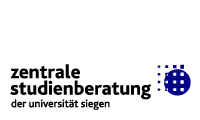Zentrale Studienberatung
im SSC-Gebäude
Adolf-Reichwein-Str. 2
57076 Siegen
Anfahrt
Erreichbarkeit der
studentischen Hotline:
0271 740-2712
Mo - Do: 9 - 16 Uhr
Fr: 9 - 12 Uhr
Mail:
info.studienberatung[at]
zsb.uni-siegen.de
Terminvereinbarung für eine Beratung über:
0271 740-2712
International Students
You find information about the admission procedure here:
STARTING
Impressum
Media and Society (interdisciplinary)

Short Information
| Restricted
admission |
Regular
study time |
Winter
semester |
Summer
semester |
|---|---|---|---|
| no | 4 semester/
8 semester (part time) |
✔ |
Admission procedure
Application required
You can apply here
Degree
Master of Arts
More information
Language of instruction
German
Deadlines
The degree program
The Master's degree program in media and society implements
an outstanding study concept: It combines two subjects and an
interdisciplinary study area.
Two of the following subjects can be chosen:
- Social sciences
- Media studies
- Business and Media Management
- Socio-Informatics
The combination of the subject Business and Media Management with Socio-Informatics is impossible.
The master’s program can be studied as an interdisciplinary
program, combines the expertise of different disciplines and
familiarizes students with the latest scientific research
results and methods. Small learning groups and unconventional
teaching methods are targeted at promoting scientific
creativity and strengthening innovation potentials. Three
modules per chosen subject are studied. The interdisciplinary
study share consists of an interdisciplinary project, a
theoretically aligned module and an elective module from the
offer of the subjects involved.
The degree program in its systematic implementation of
interdisciplinarity is targeted at the close connection between
research and teaching. Graduates are able to solve a diverse
array of concept, planning and analytical tasks. This permits
different professional perspectives depending on subject
combination.
Some examples:
- Press and publicity, fields of activity in journalism, publishing, education and further education.
- Activities in smaller & larger media companies with a business administration focus, activity in management of media agencies and companies or departments with tasks of media management, marketing or media planning.
- Activities in market and survey research, empirical social research and in
- consultancy agencies that depend on the combination of competences.
Media and society can only be studied in the interdisciplinary subject combination program.
Admission requirements
Bachelor's degree in at least one of the two chosen subjects
with grade 2.5 or better. You must document knowledge at a
scope of 18 credit points (LP) in the other subject. The
following admission requirements are required for the
individual subjects chosen:
Social Sciences: B.A.-degree
- a) in a social-sciences, political sciences or sociology degree program
- b) in a equivalent degree program with social science shares (≥ 18 LP)
Media Studies: B.A.-degree
- a) in a media-science degree program
- b) in a equivalent degree program with media-science shares or equivalent courses of study (≥ 18 LP)
Business and Media Management: B.A.-degree
- a) in a media business-sciences degree program
- b) in a equivalent degree program with media-economics shares (≥18 LP)
Socio-Informatics: B.A.-degree
- a) in a computer science degree program
- b) in a equivalent degree program with informatics shares ((≥18 LP)
Lack of prior knowledge in the second chosen subject can be caught up at a scope of up to 9 credit points (LP) in the first academic year (according to the specification of the technical examination board) (instead of the internship).
The current examination regulations at the time shall apply; exceptions shall be determined by the examination board.
Important information
Internship
An internship is recommended. A pre-internship is not necessary.
Study organization
Examination regulations/degree plan/module
manuals/internship rules
Examination regulations (POs) specify the basic structures of a
degree program (e.g. admission requirements and contents to be
studied). Students are automatically subject to the current
version of their PO when they matriculate for their first
subject-related semester. This means that even if the PO
changes during their studies, the original version according to
which they matriculated will remain valid (provided that the PO
does not expire).
The respective degree plan is the recommended example progress
of the studies in individual subjects and is part of a PO.
Supplementary provisions and details for any module to be
studied can be found in the module manually (e.g. requirements
for taking a written test or content-related information on the
modules/events, ...).
The internship rules define the conditions under which the
required or optional internships must be completed.
We recommend at least looking at the study schedule for your
degree program before the lecture time starts, to ensure that
you know which modules are intended for the start of your
studies.


